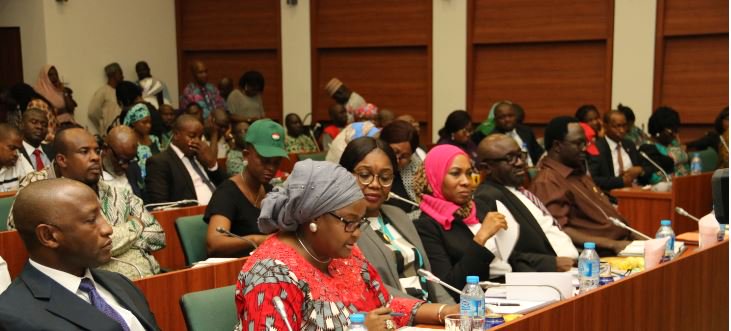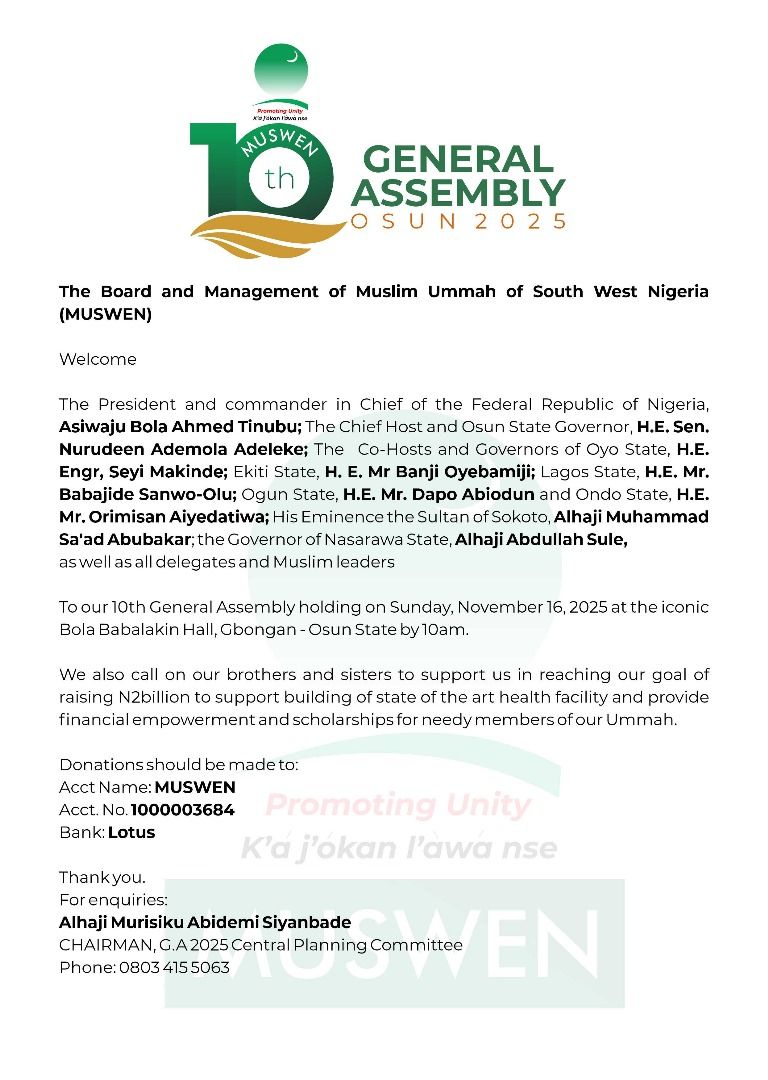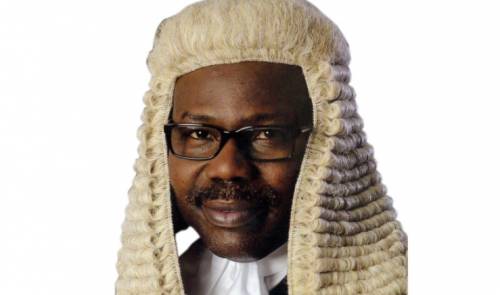Pension Act violation: Allegations false and unfounded – PenCom Boss

In response to the allegations raised by the House of Reps Ad-hoc Committee investigating the activities of the National Pension Commission (PenCom) and violation of the Pension Act, the Ag. D-G of the commission, Mrs. Aisha Dahir-Umar, has stated equivocally that allegations are false and unfounded.
The PenCom boss, who made this known at the public hearing of the House of Representatives Ad-hoc Committee in Abuja on Thursday, said: “Our submission is that the allegations are all false and unfounded. The facts on the ground do not in any way indicate any case of contravention of the Pension Reform Act (PRA), 2014, of the commission.

“The PRA, as most of my colleagues call it is our bible; we walk by it. It controls every decision we take, so we can never violate it.
“We strongly believe that the house does not have the real information and we believe that given the correct information, the house will disregard all the allegations before it.”
The reps ad-hoc committee in its resolution which was passed on the 29th of November, 2018, had raised three (3) allegations against the commission for infractions of the PRA 2014. The allegations are: Unduly creating impasse in the matter of appointment and resumption of duty of the members of the Board of the Commission; Illegal creation of additional Directorates and appointment of more directors, thereby increasing the number from 10 to 17 directors; and Illegal increase of Commission’s Staff End of Service Benefits by 300%.
Concerning the allegation of Unduly creating impasse in appointment and resumption of duty of the members of the Board of the Commission, Mrs. Aisha said, “Honourable Members of the House Ad-hoc Committee may recall that following the dissolution of the erstwhile management of PenCom on 13 April, 2017 along with the managements of 22 other Agencies and Parastatals, the Federal Government announced the names of a new management team subject to confirmation by the Senate.
“You will further recall that on 27 May, 2017, the Federal Government reconstituted the nominated team subject to Senate confirmation.
“In the interim, however, the Federal Government directed the undersigned, as the most senior career staff of the Commission, to superintend the affairs of the Commission in acting capacity, pending assumption of duty by the appointed members of the Executive Management.
“Consequently, we have in the Commission since April 2017, only a transitional management run by career staff of the Commission.
“By virtue of Section 19(3) of the PRA 2014, Mr. President has power to appoint the Chairman, the Director-General and Commissioners of the National Pension Commission, subject to confirmation by the Senate. The career staff of the Commission absolutely do not have any role or influence on decisions taken by either the Executive or Legislative arms of the Federal Government in the matter of appointment to the Board of the Commission. It is, therefore, incorrect to allege that the current transitional management is stalling the appointment or assumption of duty of the new Board members.”
With regards to the accusation of illegal creation of additional Directorates and appointment of more directors, she explained that Section 30 of the PRA 2014 provides that the structure of PenCom shall comprise “Divisions, Departments and Units as may be approved by the Board from time to time”.
“The current organogram of the Commission was approved by the Board of the Commission at its 46th meeting held on 12 June, 2015, with a structure of 5 Divisions and 20 Departments.
“This structure subsists to date and has not been altered. Consequently, it is incorrect to state that additional Directorates have been created by the Commission during the current transitional period.
“Furthermore, the Commission has not recruited any additional General Manager (i.e. Director) since the beginning of the transitional period in April 2017 to date.
“What happened was a normal and duly approved promotion exercise for career staff of the Commission, where three (3) Deputy General Managers were promoted to the grade of General Managers after duly satisfying the established criteria in accordance with the terms and conditions of their employment,” she added.
She explained that the report of the Annual Staff Performance Appraisal exercise, containing recommendations for promotion to General Manager and other grades, was approved by the Secretary to the Government of the Federation (SGF) on 18 April, 2018, in the absence of a functional Board of the Commission.
She further added that: “This is consistent with the provision of Section 17(5) of the PRA 2014 and Section 9 of the First Schedule to the PRA 2014, as well as Mr. President’s directive of 16 July, 2015 to all MDAs whose Boards were dissolved that issues requiring approval of Boards should be referred to him for decision through the respective supervising Ministries.
“Since the inception of the transitional management in April 2017, PenCom has not undertaken any staff recruitment. The recruitment undertaken by the erstwhile Executive Management on the eve of their departure was suspended by the House Committee on Federal Character due to issues associated with the process.”
Although a member of the ad-hoc committee, Hon. Benjamin Wayo, questioned the legitimacy of the President of the Federal Republic of Nigeria to “usurp” the statutory roles of the board by directing the SGF to act on his behalf.
According to him, “There is no provision in Section 17(5) of the PRA 2014, that gives the President the authority to usurp the powers or functions of the board of the commission.
“The President should be called to order for usurping the powers of the board.”
Hon Johnson Agbonayinmam, who is the Chairman of the ad-hod committee quickly countered it by saying that constitutionally, the President can direct the SGF to act on his behalf, and that the case of the PenCom is not an exception.
Hon. Iboro Asuquo Ekanem, also questioned the legitimacy of the transitional management team by the commission, saying that the PRA of 2014 does not recognize such team.
In response, the Ag DG clarified that “Transitional Management” is a mere semantic and it is temporary before the board resumes. According to her, All the Directors and Head of Departments comprise the management committee. As such the commission does not need anybody’s approval to act on operational matters like the management committee, hence the creation of the term transitional management.
With respect to the issue of illegal increase of Commission’s Staff End of Service Benefits by 300%, the PenCom Boss explained that: “Pursuant to Section 4(4)(a) of the PRA 2014, an employer may undertake to pay to his employees upon retirement, additional benefits other than the pension contributions into the Retirement Savings Account.
“Consistent with this provision and following the implementation of the Federal Government policy on 8-year tenure for Directors, the Board of the Commission approved, at its 46th meeting held on 12 June, 2015, an End-of-Service Benefits package for General Managers who have served for a minimum of 5 years on the grade.
“Furthermore, at its 235th meeting held on 4 August, 2016, the erstwhile EXCO extended on separate terms and conditions, the implementation of the End-of-Service package to cover all other staff of the Commission.
“The latter was not approved by the Board prior to its dissolution by the Federal Government.
“The Federal Government subsequently in 2016, suspended the policy on 8-year tenure of Directors, which substantially formed the basis of the approved End-of-Service Benefits package for General Managers. I
“In consequence of this policy suspension, the erstwhile Management of the Commission halted the implementation of the End-of-Service benefits for General Managers and commenced a review of same to standardize the benefits payable to all eligible staff on General Manager grade, align the benefits with the policy shift on tenure and ensure affordability and sustainability of the Scheme.
“Unfortunately, the review exercise embarked upon by the erstwhile management could not be approved by the Board before its dissolution by the Federal Government.
“Accordingly, and in the absence of a functional Board, the revised terms of the End-of-Service Benefits Scheme for both General Managers and other staff of the Commission were submitted to the Secretary to the Government of the Federation (SGF) for approval, which was graciously granted on 30 June, 2017.”
Hon. Johnson Agbonayinmam pointed out that in appendix 7 of the commission’s submission to the ad-hoc committee, it was discovered that no fund was remitted to the Retirement Savings Account (RSA) for April and July 2017.
In response, the Head, Contribution Bond Redemption Department, Mr. Olulana Loyinmi, said that “The office of the Accountant General of the Federation (AGF) deducts the monthly pension contribution federal government employees in treasury funded institutions. They deduct that amount at source and remit the amount to an account with the Central Bank of Nigeria (CBN), which we call the Contributory Pension Account.
When the office of AGF remits funds into the CBN, we have to look at the document of the staff of MDAs, when we are sure the money in that CBN account, the commission gives instruction to CBN to release the money to the Retirement Saving Account of the employees. We have some instances where the remittance from the office of the AGF are not as regular as it should be.
“Secondly, when we do remit the fund, we remit on monthly basis, but there are some instances where we remit even two months at a time.
“So what you asked for which we put here is the remittances into the RSA. These were the months in which we made the remittances and we have the list of months that they represent. So if we see a figure of N41.7bn for April, we have a list of what it represents.
“So, it means we’ve been remitting the monthly contributions of the employees. Take for instance, we have in 2017, the amount that we remitted in April is the combination of about three (3) months areas of pension contributions of retirees. We do not deduct, the AGF does.
“We remit the money depending on how soon we get the documents from Ministries, Departments and Agencies (MDAs).”
The Ag. DG of PenCom further explained that sometimes the money is not “cash back”.
“So they don’t give any money in April, then in June, they give for April, May and June. Sometimes they don’t do cash backing every month, they sometimes pay four months at once. That is how it is remitted, no money comes to PenCom,” she said.
Concerning the non-remittance to the RSA of money deducted from employees, especially by private employers, the PenCom Boss explained that the commission has recovery agents pursuing the money with penalties of interests. According to her, “We have recovery agents; so if the money is still with the employer we will eventually get it with penalty.
“We have records of how many hundreds of thousands we have recovered from employers like this.”
The House of Reps ad-hoc committee therefore adjourned the investigative hearing on the activities of the commission and the violation of the Pension Act to an unannounced date.
The Economic and Financial Crimes Commission ( EFCC ) has denied being part of any deal to exclude former Comptroller-General of Customs, Abdullahi Dikko Inde from criminal prosecution for fraud and money laundering.
EFCC made the clarification in a notice of preliminary objection it filed in a suit by Inde, in which the ex-Customs chief claimed to have entered an agreement with the EFCC to refund about N1.6billion to Federal Government’s coffers, following which he would excluded from prosecution.
Lawyer to Inde, Mahmud Magaji (SAN), while arguing his client’s counter-affidavit to EFCC’s objection on Thursday, contended that it was a breach of an existing agreement and contract for EFCC to seek to prosecute the ex-Customs chief after he has kept to his side of the bargain and made huge refund to the government.
Magaji also faulted EFCC’s claim that the suit was wrongly commenced by way of origination summons.
He argued that, contrary to EFCC’s contention, facts in the case were not contentious. He added that the issue involved in the case was simple.
Mahmud said: “Our case is simply about the interpretation of Section 174 of the Constitution and Section 14(2) of EFCC Act, and no more.
“Our decision to bring this action by way of an originating summons is the appropriate position. There is no hostility in the whole case.
“Our client was to be prosecuted for financial crimes. When he was invited, he was confronted by information the EFCC said it has against him by virtue of its investigation activities.
“He (Inde) was confronted with options of either to enter a refund agreement or be prosecuted. He agreed to a refund. And made refund in several tranches.
“At every payment, we ensured that we get evidence of payment from the bank,” Magaji said.
He identified the evidence of payment as reflected in some court documents marked as Exhibit 1 to 20D, and said “these are the evidence of the refund we made”
When asked by the judge, Justice Nnamdi Dimgba, aboutwhere the said agreement was reached, Magaji said a meeting was held at the instance of the Minister of Justice and Attorney General of the Federation (AGF).
Magaji added that after the agreement was reached by parties, an official of the EFCC, who he identified as Hajeed (who was the IPO in the case) provided an account number into which his client (Inde) made all the refund he made.
He added: “We have fulfilled our side of the agreement. It is for the EFCC to fulfil its own side of the agreement, by complying and allowing things to settle.
“We are asking that under Section 174 of Constitution and Section 14(2) of EFCC Act, the EFCC is not bound by this agreement.
“We are asking this court to enforce this agreement on them. They should be bound by the agreement,” Mahmud said.
In a counter-argument, EFCC’s lawyer, Chile Okoroma urged the court to decline jurisdiction over the suit because it was wrongly instituted.
Okoroma argued that the case was brought under the originating summons rules when facts in the suit are disputed.
He added: “They said they made some payments by agreement and we said no, we are not aware of any payment.
“They claimed Magu (EFCC’s Acting Chairman, Ibrahim Magu) was part of the agreement, but we said no. We do not know anything about the agreement they claimed to have with the AGF.
“These are triable issues. There are contentious facts and we say, we need those disputed facts to be resolved by calling oral evidence. That is our ground of objecting to the suit.
Before entertaining arguments from the two lawyers, Justice Dimgba observed that while there was evidence that the AGF was aware of the case and had been served all documents relating to it, the AGF has not filed any process in response to the case since it was commenced last year.
In a ruling, Justice Dimgba uphled EFCC’s objection in part.
The judge agreed that facts were contested by parties and ordered them to file pleadings.
He said: “Having reviewed the processes filed, I am of the view that the suit was wrongly commenced. The facts are so hostile. Parties are to file pleadings.
The judge adjourned to March 1 this year.









